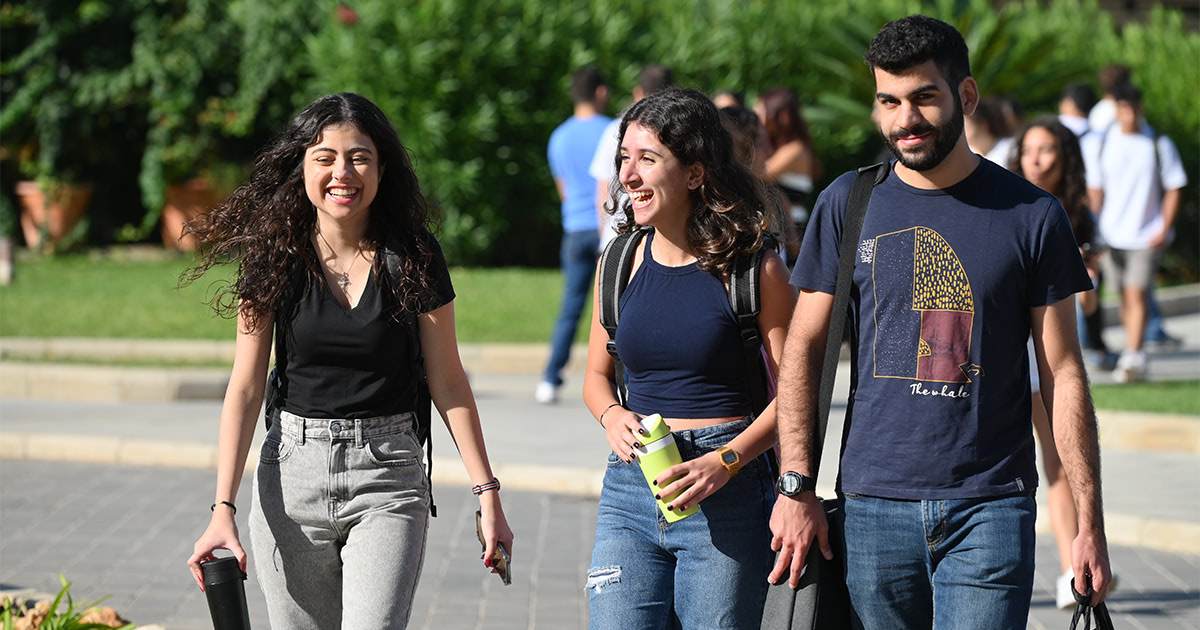LAU Ranks High Worldwide on Three Impact SDGs
The university’s scores in The Times Higher Education Impact Rankings 2024 attest to its drive for global sustainability.
LAU has placed globally at No. 13, No. 34, and in the 101-200 bracket on three Sustainable Development Goals (SDGs) in the Times Higher Education Impact Rankings 2024, a testament to the university’s continued efforts to promote sustainable development at the institutional and pedagogical levels.
“Sustainability through research, education, innovation, and partnerships is at the core of our strategic plan,” said LAU President Michel E. Mawad. “Among other strategic initiatives launched this year, we have established a sustainability office, dedicated to developing and implementing a sustainability strategy, promoting a culture of sustainability, and ensuring LAU’s positive long-term environmental and social impact.”
The No. 13 global ranking the university achieved in SDG 8—Decent Work and Economic Growth—is measured by five metrics: the institution’s economic research, employment practices, expenditure per employee, proportion of employees on secure contracts and proportion of students taking work placements.
The university’s high scores in the four THE indicators for SDG 1, No Poverty, which assess research, financial aid, and university and community anti-poverty programs, placed it at No. 34 worldwide.
In another remarkable achievement, given that all institutions are required to report on this SDG, the university was ranked in the 101-200 bracket globally in SDG 17, Partnerships for the Goals, up from the 601-800 bracket in 2023.
Overall, LAU rose to the 401-600 bracket from the 601-800 bracket in 2023.
“LAU’s high placements in SDG 8 and SDG 1 are largely attributed to its strong focus on research and innovation,” said Dean of Graduate Studies and Research Samer Saab. “The university invests in research projects that drive economic development and job creation, and supports entrepreneurship through business incubators.”
These initiatives, combined with extensive scholarship programs and community outreach efforts, added Dr. Saab, ensure that education is accessible and impactful, ultimately contributing to poverty alleviation and economic growth.
From its beginnings as a women’s college, LAU has advocated for gender equality, equity, and the right to education regardless of financial means. More recently, it adopted a strategic approach to ensure that its existing policies and procedures foster inclusion and fairness across its community, students, faculty and staff and boosted its financial aid to cater to deserving underserved students.
An in-house Gender Equality Study, led by the university’s Title IX office and the Arab Institute for Women (AiW) and supported by a committee of LAU staff, faculty and students, will soon yield a Gender Equality Plan with recommendations for improvement. Also, alongside the AiW, the university was the first nationally to adopt a paternal leave and extend its maternal leave and has incorporated a gender equality program in its curriculum.
Chief among the contributors to LAU’s improved ranking on SDG 17 is its signature program, the Liberal Arts and Sciences Curriculum (LASC), which was founded on the premise that students should possess a foundational understanding of the SDGs and their fundamental principles, which they can apply in their careers and personal lives. This year, LAU scored 84.8-90.0 in that SDG, up from 53.4-61.0 in 2023.
“Universities play a key role in addressing global problems and preparing their students for a world of economic difficulties, energy issues, and safety concerns regarding water and food supplies, among other uncertainties about global health,” said Provost George E. Nasr. “It is therefore vital that we provide our students with a broad education curriculum that prepares them for present and future challenges.”
